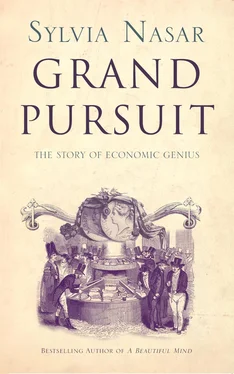Sylvia Nasar - Grand Pursuit - A Story of Economic Genius
Здесь есть возможность читать онлайн «Sylvia Nasar - Grand Pursuit - A Story of Economic Genius» — ознакомительный отрывок электронной книги совершенно бесплатно, а после прочтения отрывка купить полную версию. В некоторых случаях можно слушать аудио, скачать через торрент в формате fb2 и присутствует краткое содержание. Жанр: unrecognised, на английском языке. Описание произведения, (предисловие) а так же отзывы посетителей доступны на портале библиотеки ЛибКат.
- Название:Grand Pursuit: A Story of Economic Genius
- Автор:
- Жанр:
- Год:неизвестен
- ISBN:нет данных
- Рейтинг книги:4 / 5. Голосов: 1
-
Избранное:Добавить в избранное
- Отзывы:
-
Ваша оценка:
Grand Pursuit: A Story of Economic Genius: краткое содержание, описание и аннотация
Предлагаем к чтению аннотацию, описание, краткое содержание или предисловие (зависит от того, что написал сам автор книги «Grand Pursuit: A Story of Economic Genius»). Если вы не нашли необходимую информацию о книге — напишите в комментариях, мы постараемся отыскать её.
Nasar's account begins with Charles Dickens and Henry Mayhew observing and publishing the condition of the poor majority in mid 19th century London, the richest and most glittering place in the world. This was a new pursuit. She then describes the efforts of Marx, Engels, Alfred Marshall, Beatrice and Sydney Webb, and Irving Fisher to put those insights into action - with revolutionary consequences for the world.
From the great John Maynard Keynes to Schumpeter, Hayek, Keynes's disciple Joan Robinson, the influential American economists Paul Samuelson and Milton Friedman, and India's Nobel Prize Winner Amartya Sen, she show how the insights of these activist thinkers transformed the world - from one city, London, to the developed nations in Europe and America and now the entire world.
In Nasar's dramatic account of these discoverers we witness men and women responding to personal crises, world wars, revolutions, economic upheavals, and each others' ideas to turn back Malthus and transform the dismal science into a triumph over mankind's hitherto age-old destiny of misery and early death. This story, unimaginable less than 200 years ago, is a story of trial and error, and ultimately transcendent, rendered here in stunning narrative.












